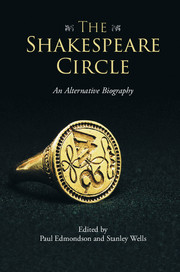Book contents
- Frontmatter
- Contents
- List of illustrations
- List of contributors
- Preface and acknowledgements
- General introduction
- Part I Family
- 1 His Mother Mary Shakespeare
- 2 His father John Shakespeare
- 3 His siblings
- 4 His sister's family: the Harts
- 5 His wife Anne Shakespeare and the Hathaways
- 6 His daughter Susanna Hall
- 7 His son-in-law John Hall
- 8 His son Hamnet Shakespeare
- 9 His daughter Judith and the Quineys
- 10 His granddaughter Lady Elizabeth Barnard
- 11 His ‘cousin’: Thomas Greene
- Part II Friends and Neighbours
- Part III Colleagues and Patrons
- Closing remarks
- Afterword
- Index
- References
1 - His Mother Mary Shakespeare
from Part I - Family
Published online by Cambridge University Press: 05 November 2015
- Frontmatter
- Contents
- List of illustrations
- List of contributors
- Preface and acknowledgements
- General introduction
- Part I Family
- 1 His Mother Mary Shakespeare
- 2 His father John Shakespeare
- 3 His siblings
- 4 His sister's family: the Harts
- 5 His wife Anne Shakespeare and the Hathaways
- 6 His daughter Susanna Hall
- 7 His son-in-law John Hall
- 8 His son Hamnet Shakespeare
- 9 His daughter Judith and the Quineys
- 10 His granddaughter Lady Elizabeth Barnard
- 11 His ‘cousin’: Thomas Greene
- Part II Friends and Neighbours
- Part III Colleagues and Patrons
- Closing remarks
- Afterword
- Index
- References
Summary
When Nicholas Rowe published the first biographical notice of Shakespeare in 1709, the poet's mother did not figure in his account. Drawing on Thomas Betterton's investigations in Stratford parish documents and local traditions, Rowe says simply that William was the son of John Shakespeare who had ‘bred him’. Even now the poet's mother is perhaps the least known of his circle. But Mary Arden's story, insofar as it can be recovered, casts interesting light on the poet's background, in both its social context and material culture, and, perhaps too, on his ways of seeing – what Emrys Jones called the ‘mental world that is a person's natural inheritance’ (Jones 1977, p. 3).
The poet's mother came from a prosperous peasant family. Her father was a husbandman, which, in the social gradations of the time, ranked him in rural society above a labourer, but below the status of yeoman. This is despite the family's submission to the College of Heralds in 1596 that Robert was ‘a gentleman of worship’ (Schoenbaum 1975, p. 167), a misrepresentation of the truth, though the story came down to Rowe. In reality Robert Arden, though better off than the poet's paternal grandfather, was a hundred-acre husbandman. His family's story is typical of a time which saw the rise of the gentry class, and the ‘great rebuilding’ of the sixteenth century; an example of how the daughter of a well-off peasant could move from a communal open hall in a village to a Stratford town house with thirty rooms and ten fireplaces at the end of Elizabeth's reign.
Mary's husband was a man of similar background; a small cultivator (described in an early document as an agricola) who apprenticed as glover (a craft in demand among the aspiring middle class in the mid-century) and rose in the world to become alderman bailiff and mayor in Stratford, eventually buying the title of ‘gentleman’.
Mary's life as wife and mother is also typical of this time of transition. Like her father, Mary had eight children. In terms of family size in this class of people, such a large family would become unusual during the sixteenth century, as prudential marriage was more and more practised: increasingly it would be the rich, employing wet nurses, who had so many children.
- Type
- Chapter
- Information
- The Shakespeare CircleAn Alternative Biography, pp. 13 - 25Publisher: Cambridge University PressPrint publication year: 2015
References
- 1
- Cited by



